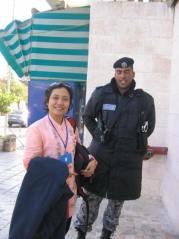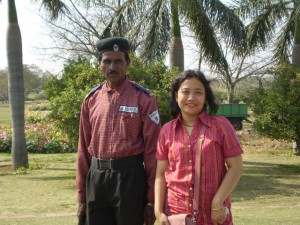Generally people would acknowledge the violation of LGBT (Lesbian, Gay, Bisexual and Transgender) as merely a fault of stigma among the society. Other people would also claim about the role of media exposure. But the truth is, another culprit behind all that happened these years is the role of the government, altough, perhaps it is not as obvious as other catalyst. Or in a different perspective, we could also say that the government, as the third factor, is the one behind the scene of the other two factors. In the matter of fact, the relations between the role of the governments in Southern Africa has a strong red thread with the fact that most countries in Southern Africa had just got their independency around the 1990s. But we must also see, who was been actually blamed for the stigma of society and the ‘entrance’ of LGBT people in southern Africa: the western imperialism. Is the western imperialism really a significant factor who contributed much for the LGBTs case, or is it just merely a scapegoat? We will see on how this factor play in the history of Southern Africa, and the relations with the bad track record of LGBT rights. And then, finally we would be able to see how this issue goes, starting from how the stigma shaped the paradigm of people in countries of Southern Africa.
As we know, the continent of Southern Africa, based on UN data1, consist of Namibia, Botswana, Zimbabwe, Mozambique, Swaziland, South Africa and Lesotho. And also, as additional, Angola (also included in Central Africa), Mozambique and Madagascar (also included in East Africa), Malawi-Zambia-Zimbabwe (in other versions also added in Southern Africa territory), and also Comoros-Mauritius-Seychelles-Mayotte-Reunion (small islands near Indian ocean and mainland of East Africa). The close continent within countries, despite of some geographical condition, allows quite good relations among the countries of Southern Africa. But it may be because of these good relation that almost all of these countries share the same negative stigma of LGBT’s: the homophobic law. It is only Botswana and Namibia who start to had tolerance toward LGBT rights, along with some NGO’s, the Christian churces campaign against intolerance for the LGBTs. But later on, recently South Africa had start a quite significant progress and had became the fifth country in the world approving same sex marriage, after Netherland, Canada, Belgium and Spain2. Later on at the end of the paper we will discuss more about the issue in South Africa. But the main point here is, as we know, the homophobic law in Southern Africa continent had two main catalyst: the HIV issue and the media exposure.
It is first because of the media, that the paradigm of women and men among the society had been shaped in such way: a women should act as a “women” and men as a “men”. Literally we could see them in the media, such as commercials, magazines. There are a lot of statements which is undirectly describing what is a woman or men like, or what they should do, and thus the society sooner or later will follow. For example, in some magazines we could see on how a woman should behave to be a “lady”, how they should dress or wear make up, etc. Second, it is because of the high rate of AIDS death among the society that has been rising year by year, and in a vicious cycle of issue that HIV was spread by doing sex, when we couldn’t actually know how it started or how it could be ended, and somehow the LGBTs are the one who was blamed for. People may think, it is because the unnormal sex relations between men and men or women and women, it may be the main cause of HIV, or it also could be because the lack of information that sex is the only main reason of the HIV spreading. So we could say, first people already got the ideal image of men and women, as had been transmitted from generation from generation, plus the effect of media exposure. LGBTs consider gender as a role, and general people describe gender as sex itself (biologically men or women). Then comes the HIV issue and there goes the trigger of LGBT rights discrimination. Nowadays AIDS issue is still a very serious issue in Africa, especially because the antidote is very expensive, and most countries in Africa are poor countries with less resources.
Next, we will see on how western imperialism is related to the issue, but first, to make the linkback easier, we have to start with noting that the role of media in Southern Africa are generally controlled under the government. Later we will also see on how this is also linked to the imperialism issue. For the citizens of Southern Africa, as what they perceive from their government, the entrance of the LGBT people was the fault of the European people when the imperialism’s influence start to shows it’s effect in Africa, especially during the cold war. Since the Suez, the trade route, was closed for around six days during the cold war, then the Europeans had begun to seek another route. The result is the discovery of the Cape Sea route by the East Indian Companies (EIC)3. After then, the access from Europe to Africa is widely opened. Speaking of which, we must see the entrance of the Europeans not as merely a newcoming race to a certain territorry, but also a newcoming system, beliefs, multistructure (including media and even possibly-more or less-governmental system), etc. As one example, we could see on how president of Zimbabwe, Robert Mugabe, abolish GALZ (Gay And Lesbian of Zimbabwe) activities and any contents related to LGBTs, like what happened in the Zimbabwe International Book Fair (ZIBF), 1st August 1995, held in Harare3. The theme was “human rights and justice”, and the books published during the fair included LGBT content books, while in the other hand the campaign for intolerance of LGBTs had been launched for around seven years. The government, who realized the existence of LGBT related contents in the books launched in the book fair, forced GALZ to withdraw from the event4.
In the other side, the abolishment of media contented with LGBT related are quite common in countries around Southern Africa. It is not just Zimbabwe who are exercising the government power to do so, but also in other countries, including the country led by Sam Nujoma, Namibia. We could also see the same point, speaking of the LGBT genocide in Rwanda a few years ago5, which was justified by the government himself. The point is, the role of the media is indeed very important toward the influence of people’s paradigm, and if the media is too much controlled by the government, it means that the government undirectly had a very strong control over the society, even for justifying the actions taken by the government or some other power source within the country. A paradigm is a very vital state of taking over people’s mind in order to control them. And when this issue comes to a critique, that the government had too much power toward the press, the government had stated it’s reply: this tradition is brought by the imperialism, and even in European countries such as UK, there are no newspaper or other press critisizing the government, so this kind of actions inside their country in Southern Africa is justified, since it was merely “a tradition brought by the western imperialism”. And so we could say, that the press in Southern Africa were also used by the government to attack the white people, as a scapegoat behind the reason of bringing LGBT people to enter African countries6.
Anyhow, now we will see how the government and the identity of countries take place in this issue. As we may predict, a lot of foreign NGO’s were trying to attempt to give a hand for solving the violation problem upon LGBTs. LGBTs in most of Southern Africa countries have no constitution rights, but without cooperation of the government, these effort would be difficult. Some Southern African governments, especially Robert Mugabe, the president of Zimbabwe, is one of those who keeps insisting that LGBT people are destroying the unity of the country. In other word, he is demonizing LGBT people. LGBT people in Southern Africa has been violated, isolated and exiled from the society and have difficulties for like searching jobs. They don’t have any constitutional rights even in their homeland, even the communities supporting them, such as local NGOs are threaten by the denial of their legal status. Moreover, when the situation gets into chaos, the LGBTs will be hunted and murdered, just like what happened in South Africa during the celebrations of women day: lesbians were hunted and executed massively. Up until now, the president of South Africa, Thabo Mbeki, still stand idly by. It is only the police who start to investigate the case, but seems like they didn’t consider the case as a serious crime7.
Moving to see the historical background of Southern Africa countries, most of them had just got their independency around the 1990s. This means that most countries in Southern Africa is still a young country, thus the biggest probability is they are not settled in the governmental system, including the system for the LGBT rights. But this is not the main problem. Since the unsettled government system would likely be a handycap toward the unity of the country, some of the Southern Africa government would make preference toward the settlement of the country, in order to avoid chaos. This is merely not a problem, if the homophobic law didn’t exist in the first place. Robert Mugabe for example, seems has been aware of this situation. Knowing that homophobic law has grown very strong among the society, he use this situation to gain power. As we know that the situation of the unsettled governmental system and chaos among people would anyway force the government to gain more power, whether it is for abuse purpose or unity purpose, and therefore they had to find settlement by approach toward former and traditional power that already exist among the society. And since the society were likely having a gigantic fear toward LGBT people, especially because of the HIV issue, this is a chance for the government to solve the problem, follow the stream and gain more power. All along the governments are trying to gain supports from social groups and Christian church, in order to emphasize that LGBTs are a sin, and therefore the society shall not give any mercy or tolerance. Even campaigns are held everywhere, some country leader were even giving open speech, saying that LGBT people is a disease toward the country’s union, they are deviant people who never deserve equal right from the very beginning. So now we just see on how the government take place in rising the homophobic law among the society.
Mugabe, in his open speech during one of his campaign, said8: “ Homosexuality degrades human dignity. It’s unnatural and there’s no question even of allowing these people to behave worse than dogs and pigs.” And in other speech he also stated: “ What we are being persuaded to accept sub-animal behaviour and we we will never allow it here. If you see people parading themselves as lesbians and gays, arrest them and hand them over to the police.” These is how the leaders of Southern African country dig a hole to plant the root of homophobic law within the society’s mindset. Other Southern African leader such as Sam Nujoma also did the same9, and supported what Mugabe had stated in the very first place. So it is now clearly seen and described on how the government plays a very important role and how it is contributed toward the violation rights of the LGBT people in Southern Africa.
And since there are no such draft of constitutional rights of LGBTs, it is very hard to solve their violation rights cases, and even more, to equalize their constitutinal rights with the other ‘straight’ citizens, since all the constitution are built based on the old system of relationship between men and women. But the next problem here is, even international law cannot be relied on. As been mentioned and discussed by Roger Alford, a professor from Pepperdine University of Law, California, in his opinio juris blog10, “ The (international) court emphasize that international law is only for expanding rights, not to contract them.” It means, that there are no such international law who could be fully relied on for such right, nor to prohibit them, and this we could also see that there are no such perfect law. The path usually taken by some countries is usually ratifying the international law, but in the other hand it takes time to legalize the law within the local country, and even more, to plant them within the society’s mindset. It would be very difficult without the support of the government, especially when the society is still haunted by the homophobic law, then the government would just simply said: “the society don’t want it”.
In times like this, it is very difficult for us to say that the rights of LGBT people in countries could be restored properly. Although some progress had been seen in Namibia, and Botswana who had the cooperation of the church, but generally the people still believe in the homophobic law, and therefore left the Southern Africa countries with the majority of homophobia society. However, South Africa, these days had start a new resolution for the LGBT people by approving the same sex marriage and had been the fifth country applying the system. President Thabo Mbeki had accept and implement homosexual policy and the legislation2, and planned to ratify the international law, altough the support is unoutspoken, and therefore there are no full guarantee that this law would be effectively implemented. Foreign NGO’s are trying to lay a hand of these problems, approaching the governments to solve the LGBT problems, but anyway if there are no such cooperation from the government any effort would be useless, especially if the government abolish such LGBT right campaign inside their territory. But since progress had been made, hopefully it could slow but sure spread among the society.
BIBLIOGRAPHY
[1] http://en.wikipedia.org/wiki/Southern_Africa
[2] http://encarta.msn.com/encyclopedia_761557321_13/South_Africa. html#p193
[3] http://www.hrw.org/reports/2003/safrica/index.htm#TopOfPage
[4] Letter from the Ministry of Information, Posts, and Telecommunications’ director of information, Bornwell Chakaodza, to Mrs. Trish Mbanga, executive director of the Zimbabwe International Book Fair, July 24, 1995.
[5[ http://www.afrol.com/Categories/Gay/q002_brc_statement.htm
[7] http://hrw.org/english/docs/2007/08/08/safric16617.htm
[6] “Zimbabwe President renews attack on homosexuals,” Ecumenical News International, April 29, 1998.
[ 8] South African News Agency SAPA, BBC summary of World Broadcast, August 3, 1995.
[9] http://www.afrol.com/Categories/Gay/q002_brc_statement.htm
[10] http://lawofnations.blogspot.com/2005/12/international-law-in-south-africa-gay_02.html
http://hrw.org/english/docs/2007/08/08/safric16617.htm
http://en.wikipedia.org/wiki/Robert_Mugabe
http://en.wikipedia.org/wiki/Thabo_Mbeki





















































Recent Comments